

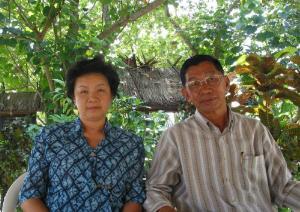
AN INTERVIEW WITH
MR. PRAMOTE AND PATCHARA PHULPHOKPHOL
OF THE ANDAMAN HOLIDAY RESORT IN KRABI, THAILAND
ON THEIR HOTEL AND ON ECO TOURISM IN THAILAND

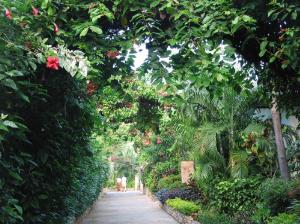
(Left) Entrance of the hotel. (Right) Trees and flowers along walkways in the resort area.
Question 1 - Business-in-Asia.com: Can you tell us a little about yourselves, your resort and how you came to locate in Krabi in the South of Thailand?
Answer: I was a Professor at a University in Bangkok and Patchara who is the General Manager of the Hotel was Chief Financial Officer of a major U.S.-Thai joint venture involving Dow Chemicals and Siam Cement. Both of us are originally from Rayong or the Bangkok area and previously had little to do with the South of Thailand. Twelve years ago, we started a small resort on what then was a remote beach in Krabi on the South Coast of Thailand just across the Andaman Sea from Phuket. We were the first resort on this part of the Coast and since Krabi then didn’t yet have a modern airport, we were a very distant destination for foreign visitors or even for visitors from Bangkok. Today the resort has grown to a total of 116 units which are a mix of cottage rooms, standard rooms, superior rooms and nearly a third of villas sprinkled throughout the 10 plus acre site. There are two major restaurants, two bars. Two swimming pools and numerous other facilities.

(Above) Beautiful Krabi beach infront of the resort
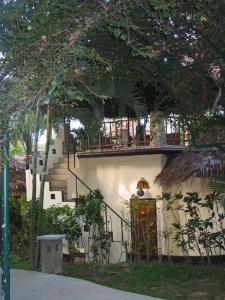
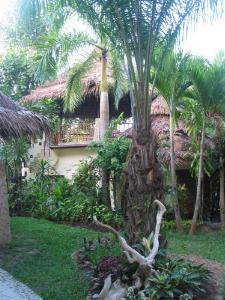
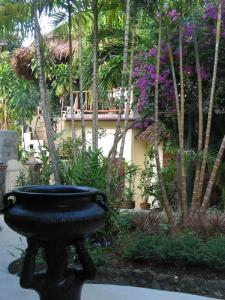
(Above) Villa Rooms at the Andaman Holiday Resort,
with open-air reading area on the roof and well-designed landscape,
has charmed tourists around the world.
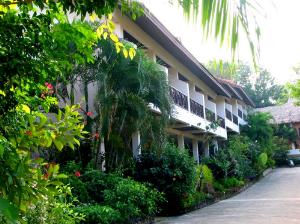
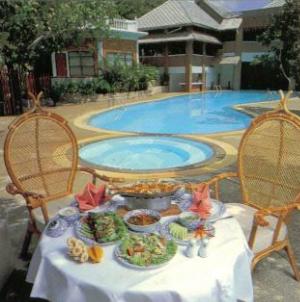
(Left) Standard room building not too far from the beach. (Right) Relaxing swimming pool area.
Question 2 - Business-in-Asia.com: You were one of the first resorts in Krabi. How have things changed over the last 12 years?
Answer: The change has been considerable. We were the first hotel on our portion of Krabi province. This year the new Sheraton property opened next door targeted at a clientele in the $200/ night plus range. Another new hotel has opened immediately next to us aiming at the high end of the market with per night prices of $500 to several thousand dollars a night and two more hotels are planned for about a mile or two away. Still, this portion of the beach I remain convinced will continue to be protected and up market. The presence of the Thai Royal Palace on the cape above the beach precludes high rise or intense development and this will help retain the natural feel of the area. Two years ago the airport was completed. The airport now takes a full range of domestic flights and visitors often arrive here after only one plane transfer. In 2004, Krabi is scheduled to add charter flights from Japan and possibly Europe. The tourism, hotel and hospitality industry in Thailand is expected to grow 10.7 percent in 2004 and will benefit greatly from the emergence of low-cost airlines and the government’s plan to make Thailand the tourism capital of Asia. Krabi has much in terms of scenic beauty to recommend itself and costs are still quite reasonable compared to Phuket and other neighboring locations and so I believe the increase in tourism investment in Krabi may very well exceed the 10.7% figure above and might well be 15% or greater this coming year.
Question 3 - Business-in-Asia.com: What distinguishes Krabi from the other beaches in Thailand? How is this place special?
Answer: We in Krabi are blessed by nature with some of the whitest sand beaches and some of the most lovely islands and coastal waters of anywhere in Asia. Around here you can see all the beauty of Phuket with less than one-third of the development and in more pristine conditions. The same islands that you will see by spending more than double or triple for a stay in Phuket can all be viewed by a short boat ride from Krabi. Further because our beaches are a part of a National Park, our beaches do not have the clutter of Pattaya, Phuket or other Thai beaches. There are no water scooters, no vendors, no people renting chairs, selling all sorts of un-needed items or other distractions. The beaches are quieter and your privacy is respected. As we are a coastal community, seafood, fresh fruit and abundant agriculture all help to add ingredients that make for unforgettable meals in quiet surroundings, with attentive and friendly service. Also, as you have seen as you sat here with me looking at the beach, this concept of protecting the environment, especially our beaches, is something that our whole community here in Krabi has come to share. As we have sat here, you saw the Thai students that passed along the beach picking up float some and cleaning the beach. This is not a chore for these students nor are they required to do this. It is something that they volunteered to assume to keep the beaches clean, protect the environment and put into practice the lessons about Nature that they learn in class. Krabi is truly special.
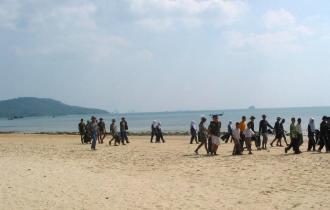
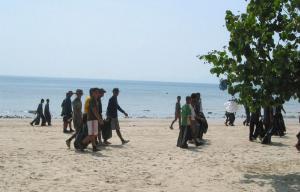
(Above) Thai students in Krabi volunteered to pick up float some and clean the beach.
These beaches are unspoilt and a part of a National Park.
Question 4 - Business-in-Asia.com: Your resort has probably the most developed trees and plantings of any resort I have stayed at in Southeast Asia. The trees are not just decorative but the effect is more like being in a tropical jungle. In the morning the singing of birds greets you as you sit on your porch enjoying the morning and in the afternoon the temperatures are cool because of the micro-climate the trees and plants create. Who is responsible for this and how did this all come about?
Answer: Although my background was in finance and education, I always had a deep interest in nature and the environment. The property that we originally purchased and the adjoining properties we subsequently added onto were a rubber plantation that covered the side of a hill and stretched down to the white sand beach. Instead of changing the topography of the land, I decided that it made more sense to build our resort to blend into the landscape. Therefore we did not alter the landscape but built our resort along the existing slope. We supplemented the foliage that already existed by adding trees and flowers that met one or hopefully more of the following four criteria:• They attracted butterflies,
• They attracted birds,
• They cooled the area and gave a shaded tropical environment
• They produced good scents or smells that added to the pleasant environment and appealed to guests and visitors.
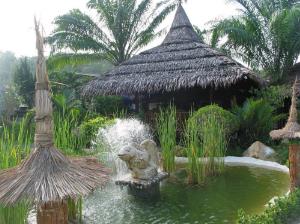
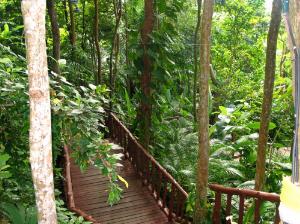
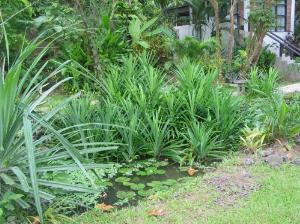
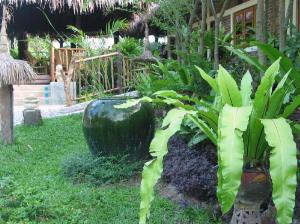
(Above) Tropical environment is important to Andaman Holiday Resort in Krabi
Question 5 - Business-in-Asia.com: Then retaining or enhancing the tropical environment was important to you and the hotel right from the first?
Answer: Exactly. This setting that our guests now enjoy took over 12 years to come to this point and everyday we try to enhance the natural feel of the grounds by adding additional trees and plantings and in continually enhancing our maintenance and other efforts. Each year we spend in excess of 15 million Baht on upkeep, this is nearly a half million U.S. dollars and is a tremendous outlay but we feel that it is necessary to give our guests the welcome and pleasant stay that we know they expect.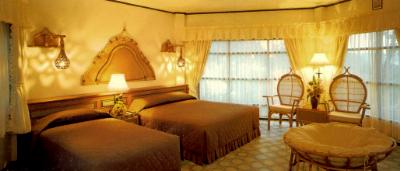
(Above) View of inside Villa Room
Question 6 - Business-in-Asia.com: Is your hotel a “Green Hotel” and do you subscribe to the “Green Hotel” concept that is now gaining adherents in Asia?
Answer: Environmental protection and responsible environmental actions have always been important to our guests who are mainly European. They are interested in the environment and I share their interest. I am in favor of any program that helps to protect the environment and the “Green Hotel” program does this. Where I differ perhaps is that we did not come to this concept recently. We have been living it for over 12 years. This means that even from our original start, we never dumped waste water into the ocean or into neighboring streams. We did built waste water treatment and use natural treatment methods to help improve water quality. We further use no hazardous chemicals or pesticides that might harm butterflies, birds and/or our staff or guests. All of our trash is separated into categories – paper, plastic, glass, organic wastes and is processed separately in accordance with recommended recycling, composting or other procedures. We have yet to make a decision on whether to seek “Green Hotel” status which in Thailand seems to be more in my opinion a bureaucratic exercise than one based on true values and observation of responsible land stewardship. Despite this, I believe that the “Green Hotel” concept is a good one and urge my fellow hoteliers to recognize that a beautiful and healthy environment is essential to us all, both economically and in terms of daily health.

View of a Krabi beach.
Question 7 - Business-in-Asia.com: You have noted that you might be willing to sell your resort. Considering the beautiful environment you have created why are you thinking of this and what next projects are you considering?
Answer: (Laughing). Yes, we would be willing to consider selling. The reason is that we have taken this resort about as far as we can on our own. Tourism is becoming increasingly a big business and the big hotel companies, whether they be Hyatt, Marriot or even Thailand brands like Bill Heinecke’s Royal Garden Group, the Dusit properties, or others all have a real advantage over the smaller operators in running a mid to large size property. A larger operator with a bigger marketing organization, such as a major resort or hotel chain, would be better able to optimize guest’s arrivals and to take up the torch from us in helping to put Krabi on the tourism map.
Despite our feeling that a sale might be in order, my wife and I still as you can see are far from retirement age and have no interest in retiring. We both think that a small boutique hotel where we could take advantage of old Thai customs of hospitality plus certain new ideas and give them a Thai focus would be a project we both would love to complete. This small boutique hotel area is an area where a small player can truly be successful. Mom Tri’s Boathouse in Phuket and the Triple Two and Metropole properties in Bangkok all show this. We therefore think that this maybe something to consider for the future. Until then, Patchara and I just want to continue to give our guests the best experience, best hospitality and to keep on protecting and enhancing the natural environment that surrounds us.
About the Interviewer:Christopher W. Runckel, a former senior US diplomat who served in many counties in Asia, is a graduate of the University of Oregon and Lewis and Clark Law School. He served as Deputy General Counsel of President Gerald Ford’s Presidential Clemency Board. Mr. Runckel is the principal and founder of Runckel & Associates, a Portland, Oregon based consulting company that assists businesses expand business opportunities in Asia. (www.business-in-asia.com)
Until April of 1999, Mr. Runckel was Minister-Counselor of the US Embassy in Beijing, China. Mr. Runckel lived and worked in Thailand for over six years. He was the first permanently assigned U.S. diplomat to return to Vietnam after the Vietnam War. In 1997, he was awarded the U.S. Department of States highest award for service, the Distinguished Honor Award, for his contribution to improving U.S.-Vietnam relations. Mr. Runckel is one of only two non-Ambassadors to receive this award in the 200-year history of the U.S. diplomatic service.
www.Business-in-Asia.com